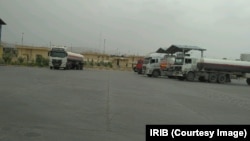A newly launched strike by Iranian truckers in seven of Iran’s provinces appears to have alarmed the government, jolting officials into trying to persuade the drivers to return to work.
The Iranian state-run news agency Tasnim quoted a transport official on Wednesday as saying it is “reasonable” for truck drivers to demand greater fees for transporting cargo to compensate for their rising costs. The official, Dariush Amani of Iran’s Road Maintenance and Transportation Organization, said the cargo fees paid to the drivers should be increased by 15 to 20 percent.
It was not immediately clear how or when such a cargo fee increase would be implemented. The official who proposed it works under Iran’s Ministry of Roads and Urban Development.
Iranian truckers began the strike Tuesday in the provinces of Fars, Hormozgan, Isfahan, Kerman, Khorasan Razavi, Lorestan and Qazvin, according to Iranians who notified and sent images to VOA Persian. In the images, the striking truckers displayed signs complaining of the rising costs of insurance, road tolls, commissions, repairs and spare parts as wages stagnate.
Iranian state media said the strike continued into Wednesday, with gasoline truck drivers refusing to supply gas stations in the provinces of Fars and Isfahan in the morning hours. The reports said public concerns about gasoline shortages resulting from the strike led to long lines at gas stations in the cities of Shiraz and Isfahan, the capitals of Fars and Isfahan provinces.
But, the Iranian news agencies quoted officials of the National Iranian Oil Products Distribution Company as saying they quickly agreed to address the truckers’ concerns in both provinces. The reports said the fueling of gas stations in the regions returned to normal later Wednesday.
Iran’s Islamist rulers long have worried that gasoline shortages could trigger social unrest. The 2-day-old strike is the first mass protest by Iranian truck drivers since anti-government demonstrations began sweeping Iran last December.
This report was produced in collaboration with VOA’s Persian Service.




